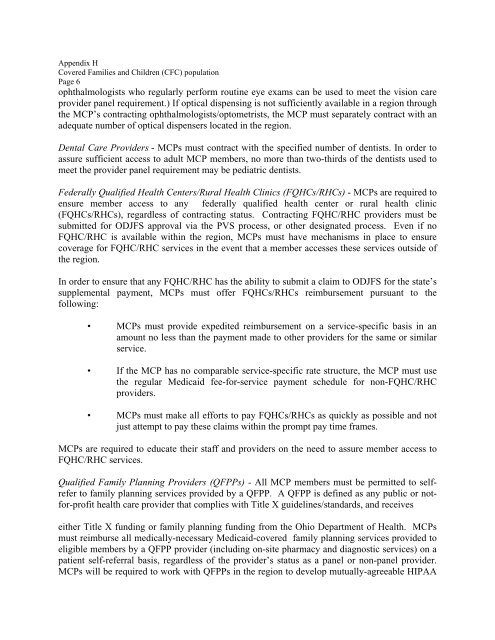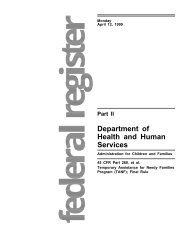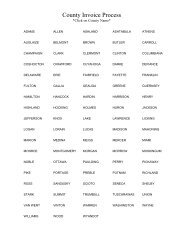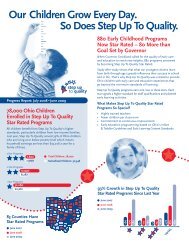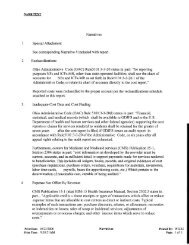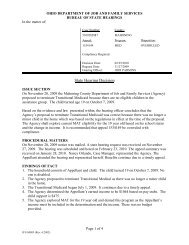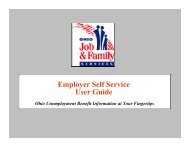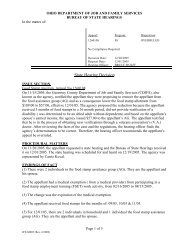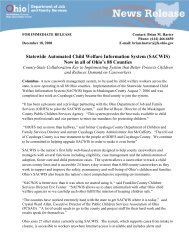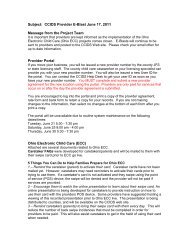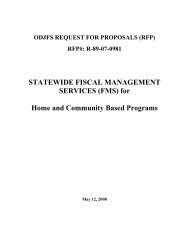Regional Generic Provider Agreement - Ohio Department of Job and ...
Regional Generic Provider Agreement - Ohio Department of Job and ...
Regional Generic Provider Agreement - Ohio Department of Job and ...
Create successful ePaper yourself
Turn your PDF publications into a flip-book with our unique Google optimized e-Paper software.
Appendix H<br />
Covered Families <strong>and</strong> Children (CFC) population<br />
Page 6<br />
ophthalmologists who regularly perform routine eye exams can be used to meet the vision care<br />
provider panel requirement.) If optical dispensing is not sufficiently available in a region through<br />
the MCP’s contracting ophthalmologists/optometrists, the MCP must separately contract with an<br />
adequate number <strong>of</strong> optical dispensers located in the region.<br />
Dental Care <strong>Provider</strong>s - MCPs must contract with the specified number <strong>of</strong> dentists. In order to<br />
assure sufficient access to adult MCP members, no more than two-thirds <strong>of</strong> the dentists used to<br />
meet the provider panel requirement may be pediatric dentists.<br />
Federally Qualified Health Centers/Rural Health Clinics (FQHCs/RHCs) - MCPs are required to<br />
ensure member access to any federally qualified health center or rural health clinic<br />
(FQHCs/RHCs), regardless <strong>of</strong> contracting status. Contracting FQHC/RHC providers must be<br />
submitted for ODJFS approval via the PVS process, or other designated process. Even if no<br />
FQHC/RHC is available within the region, MCPs must have mechanisms in place to ensure<br />
coverage for FQHC/RHC services in the event that a member accesses these services outside <strong>of</strong><br />
the region.<br />
In order to ensure that any FQHC/RHC has the ability to submit a claim to ODJFS for the state’s<br />
supplemental payment, MCPs must <strong>of</strong>fer FQHCs/RHCs reimbursement pursuant to the<br />
following:<br />
• MCPs must provide expedited reimbursement on a service-specific basis in an<br />
amount no less than the payment made to other providers for the same or similar<br />
service.<br />
• If the MCP has no comparable service-specific rate structure, the MCP must use<br />
the regular Medicaid fee-for-service payment schedule for non-FQHC/RHC<br />
providers.<br />
• MCPs must make all efforts to pay FQHCs/RHCs as quickly as possible <strong>and</strong> not<br />
just attempt to pay these claims within the prompt pay time frames.<br />
MCPs are required to educate their staff <strong>and</strong> providers on the need to assure member access to<br />
FQHC/RHC services.<br />
Qualified Family Planning <strong>Provider</strong>s (QFPPs) - All MCP members must be permitted to selfrefer<br />
to family planning services provided by a QFPP. A QFPP is defined as any public or notfor-pr<strong>of</strong>it<br />
health care provider that complies with Title X guidelines/st<strong>and</strong>ards, <strong>and</strong> receives<br />
either Title X funding or family planning funding from the <strong>Ohio</strong> <strong>Department</strong> <strong>of</strong> Health. MCPs<br />
must reimburse all medically-necessary Medicaid-covered family planning services provided to<br />
eligible members by a QFPP provider (including on-site pharmacy <strong>and</strong> diagnostic services) on a<br />
patient self-referral basis, regardless <strong>of</strong> the provider’s status as a panel or non-panel provider.<br />
MCPs will be required to work with QFPPs in the region to develop mutually-agreeable HIPAA


